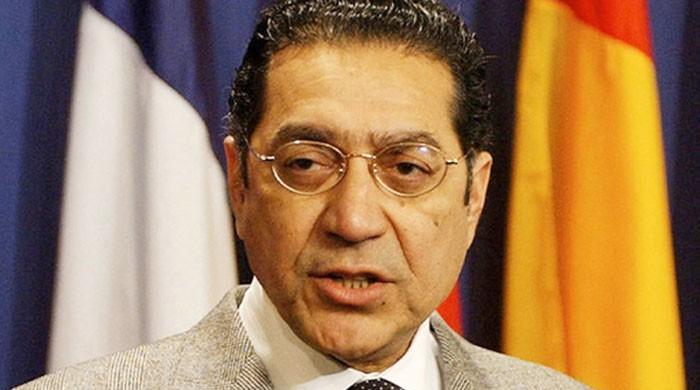UNSC session will increase pressure on India to tone down aggressive rhetoric: Akram

NEW YORK: Permanent Representative of Pakistan to United Nations Munir Akram on Friday said that the recent United Nations Security Council (UNSC) session on occupied Kashmir would increase pressure on India to step back from making aggressive moves in the region.
"The UNSC session on Kashmir has conveyed to India that it needs to tone down aggressive rhetoric and take steps toward de-escalating the military tensions in the region," Akram said while speaking to Geo News.
"A message has been conveyed to India that it should take back the aggressive moves it has made in the region. The UN can take up the Kashmir issue anytime it wants now," the Pakistani envoy said.
The ambassador further said that "50-year old UN resolutions on Kashmir had become functional yet again, rubbishing Indian arguments that Kashmir is an internal matter".
Also read: Heat waves in Pakistan, India could render urban areas unlivable: report
'CPEC outstanding example of cooperation for shared goals'Separately, Akram, while speaking at the annual ceremony for handover of the rotating Chairmanship of the G-77 on Friday said that the multi-billion dollar China-Pakistan Economic Corridor (CPEC) project was an 'outstanding example' of cooperation for shared goals.
“CPEC is an outstanding example of south-south cooperation whose benefits are not restricted to participating countries alone, but will include the region and beyond,” Ambassador Akram said at the ceremony.
The developing countries, Akram said, must strengthen south-south cooperation so as to open new avenues and present the world an alternate development model based on inclusivity, self-respect, common endeavor, and economic independence.
Also read: India plans to cut imports from Malaysia, Turkey over occupied Kashmir row
Guyana Prime Minister, Moses Nagamootoo (third left) participates in the ceremonial handing over of the Chairmanship of the Group of 77. Photo: DPIAlso read: Gwadar port starts handling Afghan transit trade: report
Referring to the unprecedented challenges facing the world, the envoy spoke of the alarming erosion of multi-lateralism and international cooperation, withdrawals from international agreements, and disregard for international legal norms.
“The unilateral use of force and foreign intervention have become more frequent,” the Pakistani envoy said, adding that the right of self-determination of peoples under foreign occupations was being brutally denied around the world.
In addition, Akram noted, there was slowdown in global economic growth under the weight of trade and technology disputes that was damaging efforts to realise Sustainable Development Goals (SDGs), eradicate poverty, and combat climate change.
Also read: US, UK, China remain Pakistan's top three destinations of exports
“While we witness a rise in per capita income; disparities and inequalities are increasing among and within countries,” Ambassador Akram said. The present model of development, he said, had delivered prosperity to many but it has not yet eliminated poverty and deprivation.
"Moreover, it has created unprecedented levels of inequality, and brought the world’s eco-systems close to tipping points that pose an existential threat to the planet," he remarked.
Over the years, the G-77 and China, which represents over 70 per cent of the world’s people, has shaped the discourse and outcomes of several multilateral processes on a range of issues, but now it needs to take on the challenges head on, Akram added.
With additional input from APP


Post a Comment